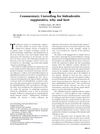 1 citations,
May 2012 in “Hair transplant forum international”
1 citations,
May 2012 in “Hair transplant forum international” Hair loss in men may be caused by inflammation triggered by hormones, and treatments reducing inflammation could potentially promote hair growth.
 November 2023 in “Materials Today Bio”
November 2023 in “Materials Today Bio” Light therapy might help treat hereditary hair loss by improving hair follicle growth in lab cultures.
 September 2023 in “Forum Dermatologicum”
September 2023 in “Forum Dermatologicum” Various treatments for common hair loss in men and women are effective, but should be tailored to individual needs and potential side effects.
 7 citations,
August 2019 in “Aesthetic Plastic Surgery”
7 citations,
August 2019 in “Aesthetic Plastic Surgery” Both surgical and non-surgical hair loss treatments lack a standard treatment plan and sufficient patient satisfaction data.
 November 2023 in “International Journal of Medical Sciences”
November 2023 in “International Journal of Medical Sciences” New regenerative medicine-based therapies for hair loss look promising but need more clinical validation.
 June 2023 in “Clinical and Experimental Dermatology”
June 2023 in “Clinical and Experimental Dermatology” Gender-affirming hormone therapy changes hair growth in transgender people, with feminizing therapy reducing hair and masculinizing therapy increasing it, but sometimes additional treatment is needed.
Natural products may help treat hair loss by promoting hair growth with fewer side effects.
16 citations,
March 2021 in “EvoDevo” Different species use the same genes for tooth regeneration.
 August 2024 in “Stem Cell Research & Therapy”
August 2024 in “Stem Cell Research & Therapy” New regenerative therapies show promise for treating hair loss.
 10 citations,
July 2022 in “Dermatology and Therapy”
10 citations,
July 2022 in “Dermatology and Therapy” Melasma's causes include genetics, sun exposure, hormones, and oxidative stress, and understanding these can help create better treatments.
8 citations,
September 2005 in “Practical diabetes” PCOS is a condition causing irregular periods, excess male hormones, and infertility, often managed by targeting insulin resistance and specific symptoms.
 December 2010 in “Vestnik dermatologii i venerologii”
December 2010 in “Vestnik dermatologii i venerologii” Certain genes and X chromosome patterns may significantly contribute to the development of hair loss.
317 citations,
April 2018 in “Journal of steroid biochemistry and molecular biology/The Journal of steroid biochemistry and molecular biology” PCOS is a complex condition in women that can lead to health issues, and lifestyle changes are the best management approach.
26 citations,
August 2008 in “Clinical endocrinology” The document concludes that more multidisciplinary research is needed to understand and treat PCOS, a condition that significantly affects women's health and quality of life.
 February 2024 in “International Journal of Molecular Sciences”
February 2024 in “International Journal of Molecular Sciences” Hair loss in Androgenetic Alopecia is caused by genetics, aging, and lifestyle, leading to hair follicle shrinkage and related health risks.
June 2024 in “Regenerative Therapy” iPSCs show promise for hair regeneration but need more research to improve reliability and effectiveness.
 44 citations,
November 1998 in “Australasian Journal of Dermatology”
44 citations,
November 1998 in “Australasian Journal of Dermatology” Accurate diagnosis is key for treating different kinds of hair loss, and immune response variations may affect the condition and treatment results.
 53 citations,
March 2010 in “British Journal of Dermatology”
53 citations,
March 2010 in “British Journal of Dermatology” Alopecia common in teens, may indicate endocrine issue, minoxidil effective treatment.
 32 citations,
August 2015 in “Anais Brasileiros de Dermatologia”
32 citations,
August 2015 in “Anais Brasileiros de Dermatologia” Black women's unique hair characteristics and styling practices can lead to specific scalp conditions, which require early diagnosis and appropriate treatment.
 9 citations,
October 2012 in “Frontiers of Hormone Research”
9 citations,
October 2012 in “Frontiers of Hormone Research” Antiandrogens are the main treatment for hirsutism, with individualized care and safe, affordable options needed.
 8 citations,
February 2010 in “Journal of Dermatology”
8 citations,
February 2010 in “Journal of Dermatology” A topical treatment safely and effectively reduced acne by causing targeted cell death in sebaceous glands without side effects.
 1 citations,
January 2018 in “Acta dermatovenerologica Alpina, Pannonica et Adriatica (Tiskana izd.)”
1 citations,
January 2018 in “Acta dermatovenerologica Alpina, Pannonica et Adriatica (Tiskana izd.)” The herbal extract was found to effectively reduce and prevent hair loss without any side effects.
 66 citations,
June 2018 in “International Journal of Women's Dermatology”
66 citations,
June 2018 in “International Journal of Women's Dermatology” No cure for female pattern hair loss, but various effective treatments exist.
 47 citations,
January 2001 in “Journal of Investigative Dermatology”
47 citations,
January 2001 in “Journal of Investigative Dermatology” High testosterone to epitestosterone ratio in hair could predict male-pattern baldness.
 36 citations,
January 2014 in “Evidence-based Complementary and Alternative Medicine”
36 citations,
January 2014 in “Evidence-based Complementary and Alternative Medicine” Pumpkin seed oil helps hair growth in men with hair loss.
 35 citations,
January 2014 in “Postepy Dermatologii I Alergologii”
35 citations,
January 2014 in “Postepy Dermatologii I Alergologii” DHT's role in hair loss is important, but measuring its level for diagnosis is questionable.
 30 citations,
December 2017 in “Medical Hypotheses”
30 citations,
December 2017 in “Medical Hypotheses” The model suggests that scalp tension could lead to hair loss, with factors like blood vessel hardening, enlarged oil glands, and poor microcirculation also playing a role. It also hints at a possible link between skull shape and baldness pattern.
 30 citations,
June 2015 in “British Journal of Dermatology”
30 citations,
June 2015 in “British Journal of Dermatology” Acne is common in women, often hormone-related, negatively affects quality of life, and requires various treatments.
 25 citations,
July 2017 in “Archives of Dermatological Research”
25 citations,
July 2017 in “Archives of Dermatological Research” Herbal products might promote hair growth with fewer side effects, but more research is needed to confirm their safety and effectiveness.
 17 citations,
August 2010 in “Journal of the American Academy of Dermatology”
17 citations,
August 2010 in “Journal of the American Academy of Dermatology” Unroofing is an effective, less invasive, and cost-effective surgery for hidradenitis suppurativa with low recurrence and improved patient quality of life.























